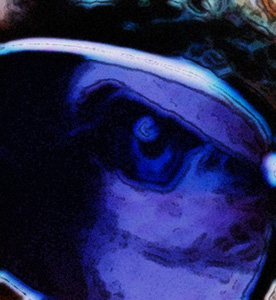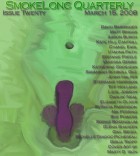Sometimes he leaves before she’s awake, and then they communicate via Post-It notes tacked to the alarm system, and today’s note reads, “Lunch?” and she’s not sure what to make of this—in the past she would have known: blue-light specials, they used to call them—and so all morning, as she weeds her garden and picks the last of her tomatoes, she feels uneasy, resentful even—there should, after so many years, be some certainty, she thinks—but when he comes home early from work to pick her up, things seem normal, and lunch is pleasant, and if it’s not quite reminiscent of other past lunches, well, they are a bit older; he wears glasses now, gold wire frames with bifocals, and she has creases along her throat, from nodding too often, or from lowering her head too much, and today, over pecan-crusted salmon, they talk about his job, and their upcoming vacation, and bemoan their neighbors’ barking dog, and that feeling she’d had all morning, that premonition that this would be the afternoon where one or the other of them says that perhaps it’s time they make a change, well, that fades into the cool October light and the mellowness of wine, and for the moment they are happy, she thinks, or at least content, and later, when they are home and he is sitting in his chair facing the television, she takes the initiative—yes, she initiates—and kneels in front of him, rests her cheek on his knees, then slides her hand along his thigh, and he doesn’t move, doesn’t look at her, and in this light, and from this angle, the only thing reflected in his glasses is flickering blue.
“Blue” was first published by Northwest Review. It appears here by permission of the author.



 The core workshop of SmokeLong Fitness is all in writing, so you can take part from anywhere at anytime. We are excited about creating a supportive, consistent and structured environment for flash writers to work on their craft in a community. We are thrilled and proud to say that our workshop participants have won, placed, or been listed in every major flash competition. Community works.
The core workshop of SmokeLong Fitness is all in writing, so you can take part from anywhere at anytime. We are excited about creating a supportive, consistent and structured environment for flash writers to work on their craft in a community. We are thrilled and proud to say that our workshop participants have won, placed, or been listed in every major flash competition. Community works.